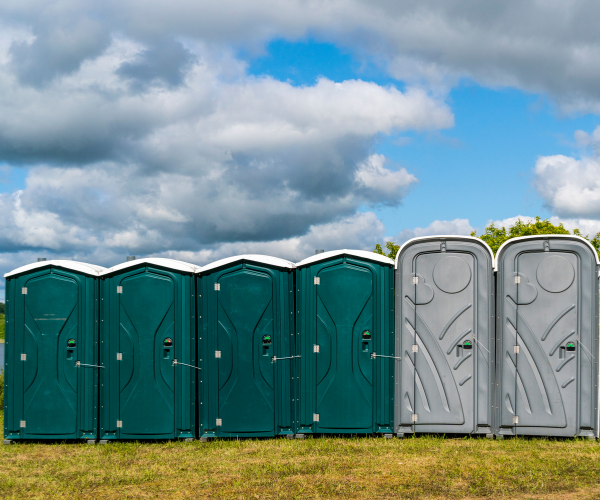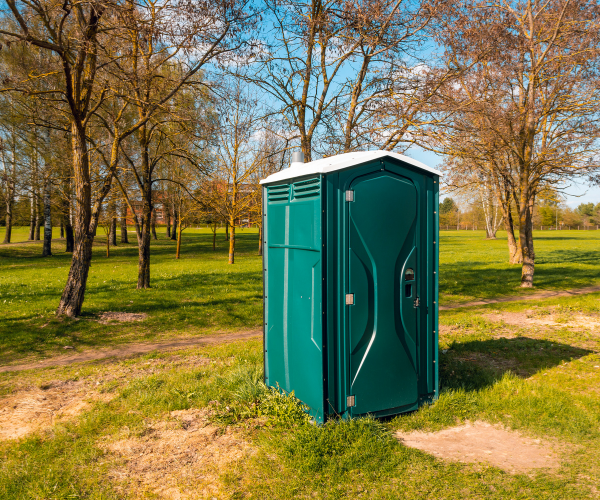Portable toilets provide several eco-friendly advantages that contribute significantly to sustainable sanitation practices. Firstly, they are designed to use less water than traditional toilets, considerably reducing water usage. By operating through a closed system, they minimize the need for constant flushing, conserving vast amounts of water daily. Additionally, many portable toilets are equipped with environmentally safe waste treatment solutions. These solutions help neutralize waste efficiently and help convert waste into reusable byproducts, which can then be repurposed for agricultural fertilization, promoting a sustainable waste cycle.Moreover, deploying portable toilets in outdoor locations reduces the environmental impact in several ways. By having dedicated, on-site sanitation facilities, event organizers and construction managers can control waste disposal more effectively, reducing the likelihood of pollution. Modern units also come tailored with eco-friendly materials and solar-powered lighting, enhancing sustainability.Furthermore, the convenience of portable toilets minimizes the need for plumbing infrastructure at temporary locations, preventing potential land disruption and environmental damage during construction. They promote better waste management by centralizing waste disposal in one location, making it easier to manage and process. Overall, their reduction in water, energy, and raw material usage contributes to a more sustainable, environmentally conscious operation, making portable toilets a clear choice for those prioritizing green initiatives while planning events or projects.

Portable Toilet Rentals in Narrows, Virginia
Call today for a free quote (276) 277-9235
Portable Toilet
Fast, Easy, & 100% Free To Get Started
Over 20 Years of Experience
R&R Enterprises has proudly served Narrows and nearby areas for over 20 years. Our family-owned business, deeply embedded in the community, delivers high-quality portable toilet solutions with unwavering commitment to customer satisfaction.
Quality Service Guaranteed
At R&R Enterprises, we deliver high-quality portable toilet services. From your first contact to timely delivery and professional maintenance, we consistently surpass customer expectations with our expertly maintained units.
Swift, Reliable Delivery
We understand the urgency of your needs, which is why R&R Enterprises offers prompt delivery services for all portable toilet rentals. Count on us for quick, reliable service every time, enhancing your event without a hitch.
Efficient Portable Toilet Solutions in Narrows
Call for a Free Quote Today
(276) 277-9235
At R&R Enterprises, we pride ourselves on being Narrows' top choice for portable toilet services. As a locally owned company, we bring reliability and a deep commitment to our community. Whether it's for bustling construction sites, elegant weddings, lively festivals, or family parties, our dependable portable toilets offer the perfect solution. We serve not only Narrows but also the surrounding areas, ensuring every event is equipped with clean, efficient sanitary solutions. Our long-standing reputation for excellence gives our clients peace of mind, knowing they're working with a trusted local partner. With R&R Enterprises, your event will benefit from our top-tier service, ensuring a seamless and stress-free experience from start to finish.


Our standard porta john rental units are durable and reliable for any commercial build site, housing development, public works project, or remodel job.Features include dome lighting, grated floors, and an “In-Use” locking mechanism for privacy and comfort. Regularly maintained, inspected, and cleaned by FusionSite at your location.

Developed as an alternative to full ADA-compliant restrooms, the Liberty is a spacious, wheelchair-accessible unit that can also be promoted as a family-sized restroom. Includes a patented flat-floor system for easy wheelchair access and maneuverability.Handrails, paper holder, and rotary latch are designed for simple, intuitive end-user operation.

Portable hand washing stations are essential for keeping your work site sanitary and clean. Features hands-free foot pumps, liquid soap, and paper towels.Perfect for job sites without water hookups, these units can handle hundreds of washes between services.
We Proudly Serve
Standard Portable Toilets
Our Standard Portable Toilets provide durable and reliable sanitation solutions ideal for any event or job site throughout Virginia.
High Rise Portable Toilets
High Rise Portable Toilets offer convenient and efficient bathroom facilities on jobsites for Narrows' high-rise building projects.
Restroom Trailers
Our Restroom Trailers offer luxury restroom options for events in Narrows, ensuring comfort and style for all guests.
Plumbing
R&R Enterprises offers top-quality plumbing services in Narrows, ensuring efficient and reliable solutions for your needs.
Septic Tank Cleaning
Septic Tank Cleaning services by R&R Enterprises in Virginia ensure optimal efficiency and longevity of your septic systems.
Grease Trap Cleaning
R&R Enterprises provides expert Grease Trap Cleaning in Narrows, Virginia, ensuring your systems operate smoothly and optimally.
Fencing & Barricades
Our Fencing & Barricades service delivers secure and effective solutions supported by the dependable team at R&R Enterprises, Virginia.
Residential Storage
Residential Storage services provided by R&R Enterprises offer secure, easily accessible solutions tailored to your needs in Narrows.
Narrows Portable Toilet and More
Our process to get a quote and arrange delivery for a portable toilet in Narrows is designed to be as convenient and straightforward as possible. Simply visit our website where you'll find forms easily accessible from the top and bottom of the page. We believe in a seamless customer experience, which is why our 'Get A Quote' buttons are strategically placed throughout our pages for quick access. After clicking the button, you'll be prompted to fill out a form requiring your first name, last name, phone number, and email. Once this is completed, a member of our dedicated customer service team will promptly reach out to you. We tailor our services to fit your unique needs and ensure timely delivery, offering peace of mind and quality service for your event. Working with us is easy, and our priority is ensuring you receive the information you need quickly. Feedback from satisfied customers shows that we consistently deliver excellence, proving our commitment to convenience and reliability time and time again.

R&R Enterprises provides more than just products; we deliver peace of mind with our premium portable toilet services. Situated in the picturesque Narrows, where the annual Narrows Homecoming Festival unites the community, our offerings enhance local events by providing comfort amidst the area's natural beauty and gatherings. Our toilets guarantee cleanliness and convenience for outdoor adventures, bustling street fairs, and locations near the scenic New River. Community is central to our mission. Our portable toilets perfectly complement Narrows' lively events and festivals. Whether supporting a community picnic at Camp Success or a canoe race by the New River, trust us to offer pristine sanitation solutions that merge comfort with the charm of outdoor settings. R&R Enterprises is your top choice for portable toilets thanks to our dedication to reliability and superior service. Proudly serving Narrows and nearby areas, we excel in rapid response and exceptional customer service. From regular maintenance checks to tailored services, we ensure a smooth, trouble-free experience. Discover our offerings and choose R&R Enterprises to bring sanitation excellence to your event. Our portable toilets reflect Narrows' commitment to quality and community pride.
Why R&R Enterprises Stands Out in NarrowsChoosing the best portable toilet service in Narrows means partnering with a company that combines local roots with unmatched expertise. At R&R Enterprises, our service is infused with the warmth and friendliness inherent to Narrows, along with a dedication to providing superior sanitation solutions.Our locally owned operations enable us to deliver quality services tailored specifically to the needs of the Narrows community. We understand the area's events, attractions, and unique requirements, which allows us to provide the perfect portable toilet options for any scenario.R&R Enterprises stands out through our commitment to customer satisfaction and deep ties to Narrows. We are not just service providers; we are your neighbors, dedicated to enhancing each event with clean, reliable, and professional portable toilet solutions.
Unmatched Speed and Reliability at R&R EnterprisesWhen it comes to portable toilet services, speed and reliability are of utmost importance. At R&R Enterprises, we pride ourselves on our ability to deliver fast and dependable services tailored to meet your specific needs. Our well-coordinated team ensures that every portable toilet is delivered on time, providing your event with immediate sanitation solutions.Our streamlined process and locally based operations allow us to respond quickly to any service request, minimizing wait times and maximizing efficiency. We understand the unique demands of events in Narrows and are committed to providing responsive and effective service.Let R&R Enterprises enhance your event with our swiftly delivered, reliable portable toilet services. Experience the peace of mind that comes with choosing a company that values punctuality and customer satisfaction as much as you do.
Narrows: Discover Our Portable Toilet Services
Renting a portable toilet in Narrows is designed to be a simple and hassle-free process with R&R Enterprises. To initiate the rental, visit our website where you'll easily locate forms placed conveniently at the top and bottom of each page. These forms are essential in beginning your rental process. Start by filling out basic contact information including your first name, last name, phone number, and email.If you're ready to move forward without delay, utilize the 'Get A Quote' buttons scattered across our pages for speedier service. Upon submitting your information, one of our responsive customer service team members will reach out swiftly to guide you through further details. They will walk you through options available, adjust to meet your specific needs, and answer any questions you might have to ensure a perfect match for your event or site.Our goal is to ensure you receive the best possible service, tailored exactly to your requirements. Feedback from our satisfied clients indicates the efficacy of our streamlined inquiry and booking process. We prioritize transparency and convenience in every step, enabling you to obtain your rental quotes swiftly with minimal back-and-forth. Choose R&R Enterprises to experience truly dedicated service efficiency.
The typical delivery timeframe for portable toilet orders with R&R Enterprises varies depending on several factors including location and order size, but we are renowned for our quick turnaround. When placing an order in Narrows, our team commits to fast delivery to ensure your needs are met ahead of your event or project start date. Upon receiving your order request, our responsive team immediately begins coordinating logistics to deliver at the most convenient time.For standard orders, we aim to deliver the portable toilet within 24 to 48 hours. However, for events of larger scale or more specialized requests, the timeframe might be slightly extended to account for customization and requisite planning to match your specified requirements.Open communication is a top priority for us, and we strive to keep you updated on the delivery status every step of the way. This allows you to plan more effectively, minimizing unnecessary downtime and ensuring everything is in place when required. In the case of any unforeseen delays, our team will proactively reach out to discuss alternatives and schedule adjustments.Ultimately, at R&R Enterprises, we promise reliability and transparency in our delivery promise, ensuring your plans proceed without hitch whenever you select our services.
Yes, R&R Enterprises proudly services a wide variety of events and construction services with our versatile portable toilet solutions. Our commitment to accommodating diverse needs means that whether you're organizing a major city festival, a local sporting event, a wedding, a corporate gathering, or a family reunion, we have the appropriate facilities for you. Our selection includes luxury restroom trailers, standard porta-potties, ADA-compliant units, and portable sinks and hand sanitizer stations, ensuring accessibility and convenience.For construction sites, we offer durable portable toilets, roll-off dumpsters, fencing, and barricades to support a safe and efficient work environment. Our extensive range ensures all logistical and sanitation elements are covered effectively, with holding tanks and additional features available upon request.We pride ourselves on offering a service that not only meets but exceeds the expectations of various event scales and types. Our experienced team provides unique solutions tailored specifically to your site layout, attendee volume, and hygienic needs, making us Narrows' trusted partner for pristine, adaptable sanitation services.

